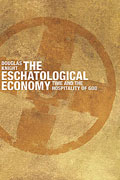
In The Eschatological Economy I wanted to show that one unfortunate consequence of reading the Scriptures without the doctrine of election of the people of God – first Israel, then also the Church – is that the Christian tradition has under-played the process of formation and transformation, and has little comprehension that a community is being changed, because it is being brought up by its God.
We have to learn the proper interrelations of Christian doctrine, or we will be putting together elements that don’t belong together. When too many scriptural notions are simply superimposed, rather than introduced only at the proper place in a narrative, we confuse what should be distinct accounts of the work of Christ.
The most obvious of these confusions is penal substitution, where sacrifice looks like the frankly pagan propitiation of a needy tyrant. To sum up what I have said so far: sacrifice does not belong with atonement; it is about the transformation of a people, so it belongs with sanctification.
The central Christian confession that ‘Christ died for us according to the Scriptures’ demands that we explain how one person can be for another. The concept of representation is crucial to the doctrine of the atonement. Here we must meet the important philosophical challenge of Kant to representation and atonement. Kant declared that one person cannot stand in for another.
So how is Christ for us ? How does he represent, substitute, intercede, supply what we lack and do what we cannot do for ourselves? The answer must take the form of a narrative of Christ that shows his action as public action, that takes place before the world, before his own people, before the Gentiles and in contest with them – and before God who approves his work.
I have been trying to set out these different audiences of Christ’s work, and to show that these atonement models also make sense in terms of a general purpose anthropology. For others do in fact speak up for us, stand in for us, invest in us – or at least we complain when they don’t.
If we go further and understand that we not merely are, but that we also we have a share in making one another the people we are, we could even call these models of atonement ‘social ontologies’.
A patient interest in Christian doctrine brings us to a concept of participation, which used to be called ‘corporate personality’. We a concept of participation to explain what we mean by the term ‘In Christ’.
You can find out more about The Eschatological Economy at Amazon.com or at Amazon.co.uk or at Eerdmans





